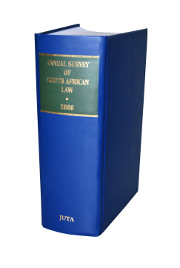Administrative Law

Administrative Law
Authors Danie Brand, Melanie Murcott
ISBN: 978 1 48513 300 1
Affiliations: Associate Professor, Department of Public Law, University of Pretoria; Lecturer, Department of Public Law, University of Pretoria
Source: Annual Survey of South African Law, 2013, p. 61 – 90
Abstract
None